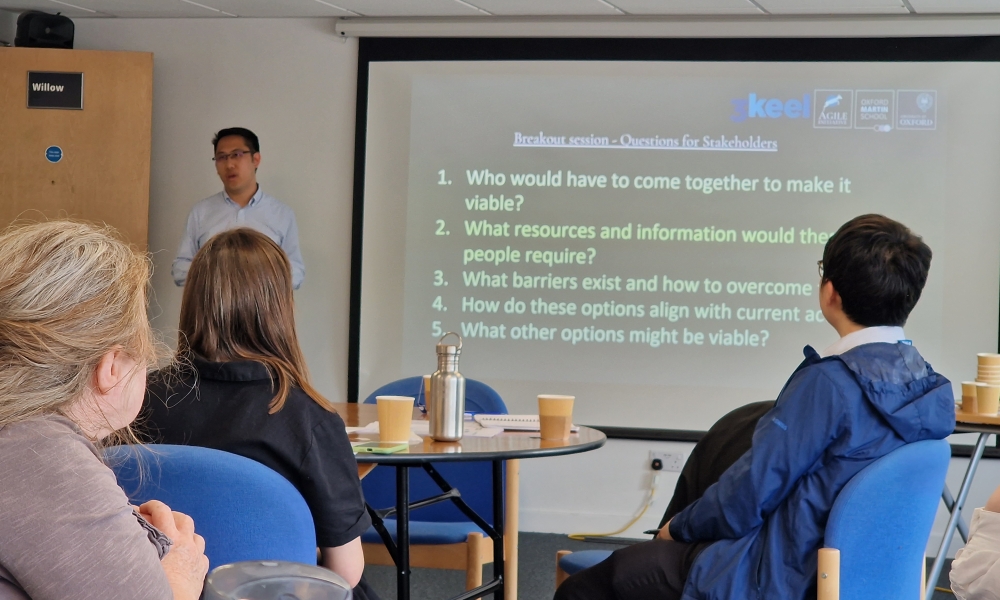Can inter-disciplinary stakeholder involvement help transform the current nutrient flows system to generate co-benefits?
Associated Sprints
Recent News
- Agile at the BES Symposium
- Youth-Led Research and Policy
- Greenhouse gas uncertainties: expanding the impact of research

Third Stakeholder Engagement Workshop bridges knowledge gaps and draws closer to a tangible action plan.
In the current and lasting crisis attributed to nutrient mismanagement, there is a need to delve into all different aspects of this challenge and provide solutions which are both radically in line with the policies and are practically viable. Continuing with its primary role in encouraging stakeholder involvement in developing plans for nutrient circularity through various workshops, the Agile, ‘Can we Turn Waste into Resource?’ Sprint held its third stakeholder engagement workshop on 15th May 2023 in Leicester.
The theme of the workshop was ‘Re-designing nutrient flows in Leicestershire’ and was a step closer to developing a tangible action plan for the decision-makers in Leicestershire, it could also be applied to other parts of the country depending on the local contexts. 18 participants attended from the Environment Agency, DEFRA, local authorities, research institutes and the waste management industry.
After an overview of the comprehensive picture of the organic waste flow and management system of Leicestershire, the researchers presented the challenges in the current system and delved deeper into four re-designing options:
1) Upstream wastewater solutions
2) Transforming digestate to create targeted nutrient products
3) Downstream farming interventions
4) Nutrient co-location
As well as the environmental benefits of these interventions, researchers highlighted how these opportunities can be the entry point for innovate businesses in the Leicestershire area benefitting the local economy. This first session ended with stakeholders’ feedback on the reasonings around current waste management processes in the region. For instance, local authorities clarified that the reason for waste haulage across counties is the varied gate fees at different disposal facilities and said that they would like to minimise the haulage; Representatives from DEFRA and the UK Anaerobic Digestion and Bioresources Association (ADBA) surfaced that the farmers have negative perceptions about using manure and digestate in animal housing which is a barrier for recycling nutrients in livestock farming. They noted that farmers are currently committed to using sand as bedding for their milking cows. They also said that monetary incentives could encourage better nutrient management practices in agriculture.
The discussion around overcoming challenges continued in the breakout sessions, where each group discussed the bottlenecks and benefits of the four re-designing options presented by the research team. It emerged that there is a lack of knowledge sharing between local authorities and national players like DEFRA and NERC. The DEFRA representative was keen to understand more about the waste movements across counties as it has national-level implications for developing anaerobic digestion plant infrastructure. The ADBA representatives provided a summary of farm-scale challenges and highlighted the role of consumers and the food market in incentivising investments for optimised nutrient recycling at the farm scale. To this DEFRA representatives responded by explaining regulations and standards for using processed digestate and organic matter as fertilizer on farms. This workshop turned out to be a great example showcasing why bringing stakeholders together is important for bridging knowledge gaps and building partnerships to accelerate transformative research agendas.
The discussion on re-designing options was followed by stakeholders’ feedback on project outputs that can be used as guiding notes for stakeholders for developing nutrient circularity agenda in their respective organisations. This included 1) an action plan for the different stakeholders in farming, government, industry, and local authorities; and 2) Recommendations on addressing the barriers to effective waste processing and haulage. These will be developed by the Sprint team after one-on-one consultations with the stakeholders.
The final stakeholder workshop is planned in September where the Sprint’s final outputs will be presented and any needs for the follow up research will be discussed.



